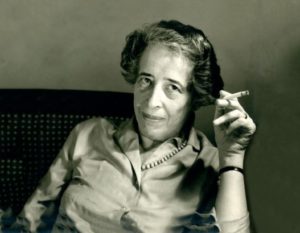Reading Hannah Arendt’s On Violence in Israel

Hannah Arendt. Private Archive.
Sarit Larry writes in Fathom, “It is, I think, a rather sad reflection on the present state of political science that our language does not distinguish between such key terms as power, strength, force, might, authority, and, finally, violence – all of which refer to distinct phenomena. To use them as synonyms not only indicates a certain deafness to linguistic meanings, which would be serious enough, but has resulted in a kind of blindness with respect to the realities they correspond to … power and violence are opposites. Where one rules absolutely, the other is absent. – Hannah Arendt, On Violence, 1970.
I have led Israeli-Palestinian multicultural initiatives in Israel since 2013. My experience has left me feeling extremely hopeful and completely despairing at the same time. This essay examines that contradiction by tracing it to the pressure exerted by the dominant model of security in Israel, which views security as a function of the control of the means of violence. The more guns we have, goes this view, the safer we will be. I argue here for the value of an alternative model of security, understood as the absence of conflict or its diminished likelihood, once a shared public life dries up the ground on which conflict thrives. I base the distinction between these two models of security on Hannah Arendt’s description of power and violence in her seminal study On Violence.
My intent is not to suggest that the latter, ‘power-oriented’ model of security can simply displace the former, ‘violence-oriented’ model. Rather, I explore the potential for Israeli-Palestinian multicultural efforts in light of a possible synergy between the two.” (More…)
